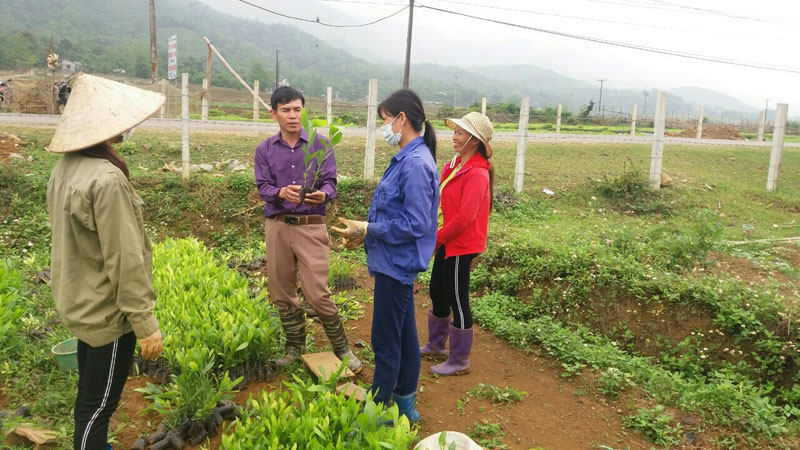
(HBO) – In recent years, the local people in Kim Boi district have concentrated on economic developments towards forest production. Forest economic development brings realistic benefits for economy-society, protects watershed forests, protects environment, increases forest cover and creates jobs, ensures stable income and contributes to hunger eradication and poverty reduction for the local people.
The nursery of Mr. Quach Van Canh’s family at
Ma hamlet, Cuoi Ha commune, providing the acacia seedlings has become a
familiar address for many farmers inside and outside the commune.

Mr. Quach Van Canh at Ma hamlet, Cuoi Ha
commune (Kim Boi district) tested the quality of acacia seedlings before
exporting.
Before implementing the nursery model, Mr.
Canh’s family mainly cultivated rice and corns but their productivity and
economic efficiency were very low. It was realized that the movements of
planting forest in the commune as well as in the district have developed
strongly while the supply of seedlings was weak, and the farmers had to
purchase seeds from other places for double price but the survival rate of
trees was low. In 2013, he borrowed 20 million VND from the District Bank for
Social Policies in order to invest in acacia nursery with the area of over 1000
m2. In the first year, Mr. Canh planted one kilo of Acacia
auriculiformis and Acacia mangium. Because of the proper application of
techniques and being hard working to monitor each tree, he got incredible
earnings from over 300 thousand seedlings which have been sold out with the
average price of 400 VND per tree. Excepting for all expenditures, the net
profit was about 35 million VND. Perceiving the high economic efficiency from
the acacia nursery, up to the present, his family has expanded the area by 2000
m2 as well as increased nearly 1 million trees per years. Apart from
all expenditures, his family earns approximately 100 million VND annually.
Because of the nursery, Mr. Canh’s family has currently had a stable life and his
children have sufficient conditions to study. Not only pioneering in economic
development and enriching legitimately, but Mr. Canh also created regular jobs
for five workers in the hamlet with the average income of three million VND per
person per month.
Anyone found to be encroaching upon the forest, even if it is just one bamboo shoot, will face penalties. This commitment has been unanimously added into the covenant of Bua Cau hamlet, Hung Son commune in Kim Boi district, to protect the forest.
The Hoa Binh Power Corporation (PC Hoa Binh) has applied synchronous measures to gear up for the coming summer season when power consumption demand surge may cause a risk of power supply disruption.
Appreciating the abundant potential and strengths of his hometown for tourism development, Ha Cong Hung, Deputy Secretary of the youth union of Mai Chau district’s Mai Hich commune, embarked on producing smoked meat with a desire to introduce his homeland's specialty to domestic and international tourists.
Hoa Binh farmers are investing big in their chilli pepper cultivation areas after the first batch of 7.5 tonnes of pickled chilli peppers was shipped to the Republic of Korea (RoK) by Tien Ngan Trade and Investment Co., Ltd last month.
Recognising the role and importance of developing the collective economy, the northern province of Hoa Binh has promptly issued support policies to propel the development of the economy, making important contributions to local socio-economic development.
Prime Minister Pham Minh Chinh attended a groundbreaking ceremony for an electronic printed circuit board (PCB) factory at Da River Left Bank Industrial Park in Hoa Binh province on April 13. The electronic PCB factory is invested by Japan's Meiko Group at a total cost of 200 million USD.



